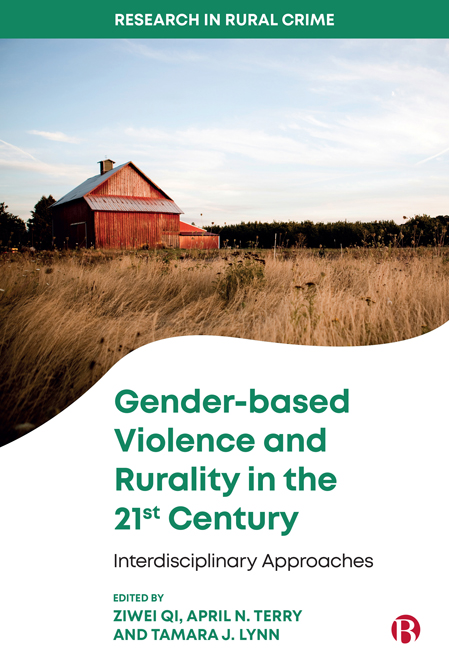Book contents
- Frontmatter
- Contents
- Series Preface
- List of Figures and Table
- List of Abbreviations
- Glossary
- Notes on Contributors
- Foreword
- 1 Understanding Rurality and Gender-based Violence
- PART I Rurality and Gender-based Violence
- PART II Beyond the Rural/Urban Divide: Critical Issues in Gender-based Violence
- PART III Access to Rural Justice: Economic Consequences and Policy Implications
- Index
12 - Rural Rape Crisis Centres and Extreme Financial Deprivation
Published online by Cambridge University Press: 20 January 2024
- Frontmatter
- Contents
- Series Preface
- List of Figures and Table
- List of Abbreviations
- Glossary
- Notes on Contributors
- Foreword
- 1 Understanding Rurality and Gender-based Violence
- PART I Rurality and Gender-based Violence
- PART II Beyond the Rural/Urban Divide: Critical Issues in Gender-based Violence
- PART III Access to Rural Justice: Economic Consequences and Policy Implications
- Index
Summary
Introduction
Rape crisis centres (RCCs) were born out of the women's liberation movement of the 1970s in the United States. Though they have changed over the past 40 years and institutionalised into more formal structures (Campbell et al, 1998), they retain a central importance in the struggle to end sexual violence. RCCs are still the only organisations that exist solely in support of survivors of sexual violence. While sexual victimisation remains at epidemic proportions (Black et al, 2011), RCCs will remain a much-needed resource for all survivors but especially those who cannot afford mental health services or do not find mainstream services to be welcoming spaces. Past research has demonstrated the importance of RCCs and advocacy work in improving survivors’ experiences within formal systems of reporting and help-seeking (Campbell, 2006). Yet, chronic underfunding of RCCs is a persistent problem and routinely acts as a barrier to reaching more survivors (Ullman and Townsend, 2007). The tension between professionalisation and more grassroots approaches revolve partially around the issue of funding sources and whether or not being beholden to state funding is more harmful than helpful. Critical feminist scholarship on sexual violence must also consider the economic violence of austerity governance – for the people who rely on such services and for the anti-violence movement itself – when theorising societal and community responses to gender violence.
Analysing interview data from rural RCC workers during a state fiscal crisis that lasted for two years, I explicate the survival strategies they engaged in and hypothesise that conditions of extreme deprivation coupled with ‘smart’ survival strategies must be viewed as an extension of gender violence and not separate from it. Rather than take for granted these conditions, scholars and practitioners must incorporate them in their analysis as part of the continuum of (state) violence.
Background
The inception and proliferation of RCCs and domestic violence agencies were a tangible outcome of the women's movements of the 1970s. Black women had been organising for decades around sexual violence, as part of a larger struggle to gain bodily autonomy from slavery through de jure Jim Crow segregation, forming the basis of the modern Civil Rights Movement in the United States (McGuire, 2010). Jim Crow laws, which began in 1865, were local and state statutes legalising segregation in the United States (Alexander, 2010).
- Type
- Chapter
- Information
- Gender-based Violence and Rurality in the Twenty-first CenturyInterdisciplinary Approaches, pp. 183 - 197Publisher: Bristol University PressPrint publication year: 2023



